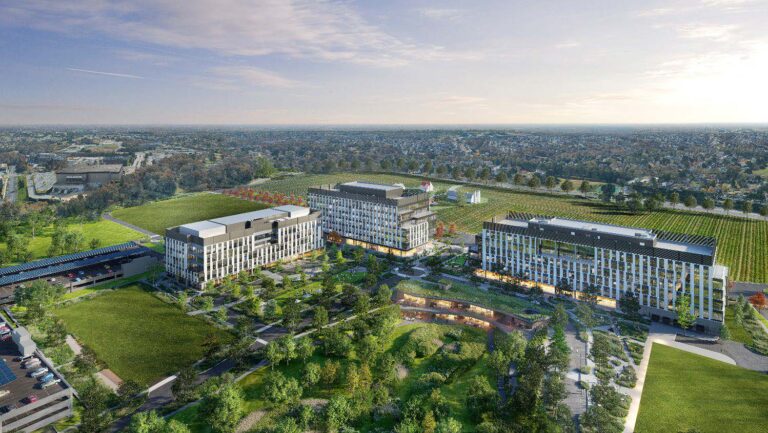Trammell Crow gets OK for first life sciences buildings for long-awaited Maryland project
By Murray W. Wolf

Trammell Crow’s kickoff project at the Belward Campus consists of three life sciences buildings totaling 756,276 square feet, a retail pavilion and three structured parking garages on 66.5 acres. (Rendering courtesy of Trammell Crow Company)
The long-awaited development of life sciences space on the historic Belward Farm tract is finally about to move forward.
The Montogomery County (Md.) Planning Board voted 5-0 on March 30 to approve Trammell Crow Company’s initial site plan application for the life sciences component of the proposed Belward Campus. It would be the first project in a planned multi-phase development that could bring up to 1.41 million square feet of research and development (R&D), biotechnology offices, related labs and a retail space to the site during the next 10 years.
Trammell Crow’s kickoff project consists of three life sciences buildings totaling 756,276 square feet, a retail pavilion of about 6,000 square feet, and three structured parking garages with a total of 2,005 parking space on 66.5 acres on the north side of the property. The planning board also unanimously approved a related forest conservation plan.
In his testimony before the planning board, Trammell Crow Managing Director and Principal Eric Fischer said, “This is an extraordinary project that will bring incredible opportunity to the county… We’re working with amazing global companies that are expressing interest in being here in Belward.”
A brief history of the Belward property
The Belward Farm saga has been widely reported over the years, so we won’t rehash it in great detail. But, to provide some context, here is a brief history.
A Montgomery County farm, just outside of modern-day Rockville, Md., that had been in the Banks family since the 1890s was sold to Johns Hopkins University in 1989. In 1996, Johns Hopkins got initial approval for a phased life sciences campus of up to 1.8 million square feet on the property. When Elizabeth Beall Banks, the last surviving family member to live on the farm, died in 2005, Johns Hopkins took full possession of the 138-acre farm and eventually proposed a much larger life sciences development of up to 4.7 million square feet.
About 30 acres on the eastern portion of the land were later sold and developed, and that part of the property is now home to several users, including GlaxoSmithKline and Novavax Inc. Johns Hopkins submitted a new concept plan in 2011 calling for a development with up to 14 buildings and 1.41 million square feet on the remaining 108 acres (since whittled to 107 acres by infrastructure improvements).
Meanwhile, some surviving family members, who felt a larger development was not what the late Ms. Banks had intended, opposed the plan and kept it tied up in litigation for several years. A court of appeals ultimately refused to take the case in 2014, but John Hopkins continued to face some opposition from local residents and environmental groups. In 2016, the university announced a new plan for the Belward campus, calling for a mix of research, commercial and residential development, but the project still did not move forward.
In October 2021, the Montgomery County Planning Board approved a site plan for a medical office building (MOB) on 11.8 acres at the site’s southwest corner, immediately east of the historic farm house, barns and its outbuildings. Construction of the $73 million, 126,200 square foot Johns Hopkins Medical Office and Surgery Center at Belward, referred to as Phase I of the development, is scheduled to begin in August. The remaining 107 acres has remained undeveloped.
A ‘transformative development’

Trammell Crow Managing Director and Principal Eric Fischer appeared before the planning board March 30. (Photo courtesy of the Montgomery County Planning Board)
In March 2022, Trammell Crow submitted a concept plan for Phase II: the life sciences development on the northern 66.5 acres.
Subsequently, the Montgomery County Planning Department staff said during the March 30 meeting, there were many public comments and questions about the proposal, including matters of traffic, parking and the preservation of the historic Belward farm, among others. But all of those issues were either previously approved or were addressed after what Mr. Fischer described as “tens of thousands of hours of work” by Trammell Crow, its architecture firm, Gensler, other members of the development team, and city staff.
Natasha Fahim, a planner with Montgomery County, said at the planning board meeting that the current site plan application for the “transformative development” was “achieved through the constructive dialog between the planning staff and applicant team.”
That dialog also needed to factor in the role of the high-profile Belward site as part of the county’s designated 4,360-acre Great Seneca Science Corridor along Interstate 270, according to Carrie Sanders, chief of the Mid-County Planning Division.
“This project is actually a really important step forward for the 2010 Great Seneca Science Corridor master plan, and the county’s growing biotechnology sector,” she said during the planning board meeting. “This is the largest-scale site plan we have seen on the overall 107-acre since 1997.”
Ms. Sanders went out to briefly recount the long history of the efforts to develop the Belward property, starting in with Johns Hopkins’ initial site plan approved in 1996 and through in the current proposal from Trammell Crow.
Tamika Graham, a planner with the county, described the plans in more detail and noted, “This project is going to contribute significantly to the growth of the county’s biohealth and life sciences hub, and it will also lay out the foundation for future development.”
As a result, the developer was able to submit a plan in recent weeks that received a strong recommendation from the planning department staff, culminating with last week’s unanimous approval by the planning board of the Phase II site plan, as well as the forest conservation plan.
Now, Trammell Crow can move ahead with development – 27 years after Johns Hopkins first won approval for the first iteration of a string of life sciences development plans that have been proposed for the Belward property.
“We are really looking forward to seeing the campus come alive,” Montgomery County Planning Board Commissioner Mitra Pedoeem said at the meeting.
Board Chairman Jeff Zyontz added, “This is a complicated project. I can see why it took so long.” Directing his comments to Mr. Fischer, he added, “Congratulations for your patience and endurance.”
Only the beginning
The approved Phase II site plan includes buildings of 265,392, 192,656 and 298,228 square feet, as well as the retail pavilion and parking structures.
Earlier in the meeting, as she summarized the proposal, Ms. Graham said, “I also want to note that additional development is anticipated north of Belward Campus Drive. That is not part of this application… The property has the capacity to be developed up to 4.7 million square feet, and so this anticipates some future amendments.”
Additional development would require its own site plan approvals, she said.
Mr. Fischer said the future expansion of the campus is part of the long-range objective, adding, “This is an extraordinary project representing several billion dollars of investment into the county” during the next decade.
Dallas-based Trammell Crow Company, a wholly owned subsidiary of CBRE Group Inc. (NYSE: CBRE), is currently involved in $3.9 billion in life sciences projects in the Maryland, Boston, Atlanta, Chicago, San Francisco and San Diego areas, Mr. Fischer said.
As for the Belward project, he said, “One of the things that I am most excited about – and we at Trammell Crow are most excited about, and we hear this consistently from every world-leading life sciences company – is, ‘Great project today. But what is the next phase?’
“Life sciences and biotherapeutics is one of the most explosive industries, and it needs growth,” he continued, “and it’s very disruptive to up and move out to another location. So what makes this site truly world class is the ability to grow in place.”
This longer-range plan enables Trammell Crow to work with tenants to accommodate future expansion, he said.
In conclusion, Mr. Fischer said, “Again, on behalf of Trammell Crow, we appreciate your time, your thoughtfulness, and we look forward to visiting with you over the next 10 years.”
For a longer article with additional details and background on the Belward site, please click here.
To view the Belward Campus proposal on the Montgomery County Planning Board website, please click here.
News Release: Trammell Crow Company Announces Plans for a Life Sciences Campus in Maryland
The full content of this article is only available to paid subscribers. If you are an active subscriber, please log in. To subscribe, please click here: SUBSCRIBE







